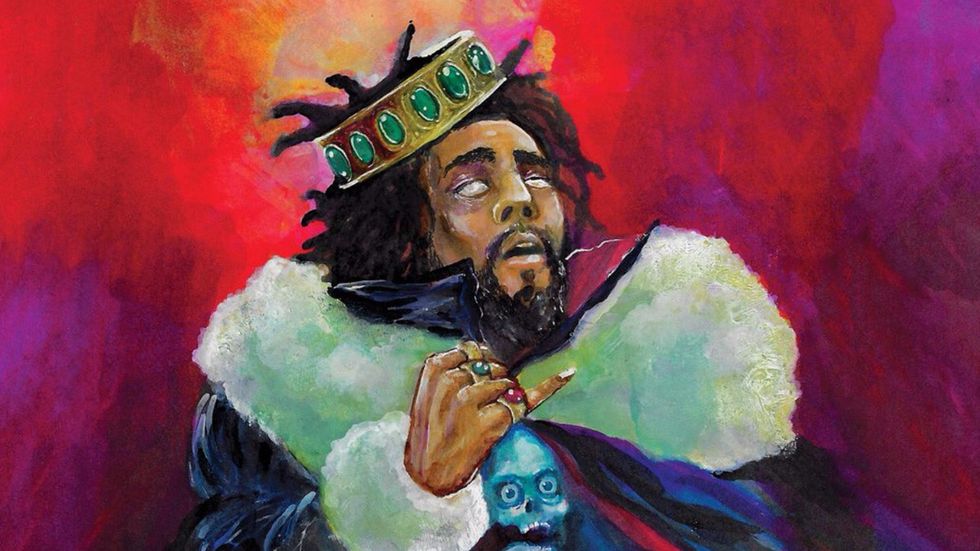J. Cole is a very prominent rapper in today’s music industry and his recent "KOD" album broke Spotify and Apple Music’s streaming record for the first-day release of an album. His audience is massive, and he has the impact capabilities to speak his mind about important topics and ideas, which he is doing on this record and which he has done on previous records as well. He is a very passionate person and talks about a lot of issues in his records but, unfortunately, that’s about it. His enthusiasm on "KOD" feels underwhelming on many of the tracks and the album feels like a solemn message and a banger but it falls awkwardly in between.
While listening to the album, I noticed it was split up into two sections: the first is about getting into drugs, how it affects you, and what you do when on drugs; the second section talks about his personal strife with drugs, what he has been through, and his solutions. Although this is not exactly split, most of the songs fall into these categories. The album starts off with an airy “Intro” and then gets into “KOD,” the title track. I have mixed feelings about this track. It is a different style than I was expecting as an opener and it is slightly unsettling, but not in a bad way. After listening to it more, there seemed to be a lack of passion that I thought I heard the first time around. Following that is “Photograph,” again an interesting, unsettling track in which J. Cole’s beats and verses are pretty good on these tracks but the choruses in the beginning of the album involve him trying to sing but falling a little short.
The next three songs, “The Cut Off,” “ATM,” and “Motiv8,” are all the “bangers,” on the track and it never really gets hard, again. The biggest problem with these songs is that it was hard to tell which one I was listening to. They were back to back and they all had the same chorus structure: a repeated triplet line. Listening to it in the background on the first listen, it was confusing because by the time I got to the end of “Motiv8,” I was really confused that I skipped three songs. “Kevin’s Heart,” is an okay track, but not a standout.
Starting with “BRACKETS,” J. Cole gets to do what J. Cole does best: talk to his audience. He speaks of money and doing taxes, containing one of the best verses in his rap career. He talks about how people should know where their taxes are going to and how people die in gunfights because their taxes paid for those guns to be in the community. It is a powerful piece that stands out as a highlight of the album. “Once an Addict – Interlude” is a very personal song (something I’d honestly love to see more of, since I think this is his best work) about his mom’s addiction and his struggles of trying to deal with it but never helping her. A regret-ridden song that will make you think about mental illness and depression.
“FRIENDS” brings back the idea of drugs again and he is trying to talk to his friends, naming them specifically but altering the vocals so you can’t make out their names. There is a lack of understanding about a solution to drug problems from Cole because his solution is to meditate instead of taking drugs. Now, this is what he did to help himself out, but it is easier said than done. It kind of feels like a nice rhyme but nothing more when he says, “Meditate, don’t medicate.” A follow-up is “Window Pain,” where he talks about all the problems in the world and he is just confused as to why they exist, not really giving a solution. It is on the verge of complaining but he gets away with it.
The final song on the album, and the most controversial in the media is “1985 – Intro to ‘The Fall Off.’” He discusses the issue with modern rappers following the hype and never understanding what they are rapping about. Many people are calling this a diss track, which is what it sounds like at first, but upon further inspection, he is only like a friend giving another friend advice. A lot of modern rappers nowadays like Lil Pump and Lil Pimp and Lil Yachty and Lil Uzi Vert (I think you see a trend here) are all turning Pop and not realizing they are going to be last month’s rapper because when those kids that listen to them grow up, they’ll realize the problem with them and move on. He is trying to help them and tell them that he doesn’t want them to be a name today and gone tomorrow.
Rap can be an impactful genre, but a lot of white kids are using these new rappers as an incorrect view into black culture and many rappers are falling into this trap for the fame. This track is most definitely the best track on the record because J. Cole is talking so he spits the truth to anyone who will listen.
3/5. "KOD" contains a wide array of material, with topics ranging from drugs to modern day music, to solutions (or lack of them), to personal griefs. I admire J. Cole for trying to get his point across and his passion, but it seems he will do anything to get his point across, without truly thinking about the musical aspect of it. Honestly, he might be a good poet instead of a rapper since his main goal is to preach his message.















